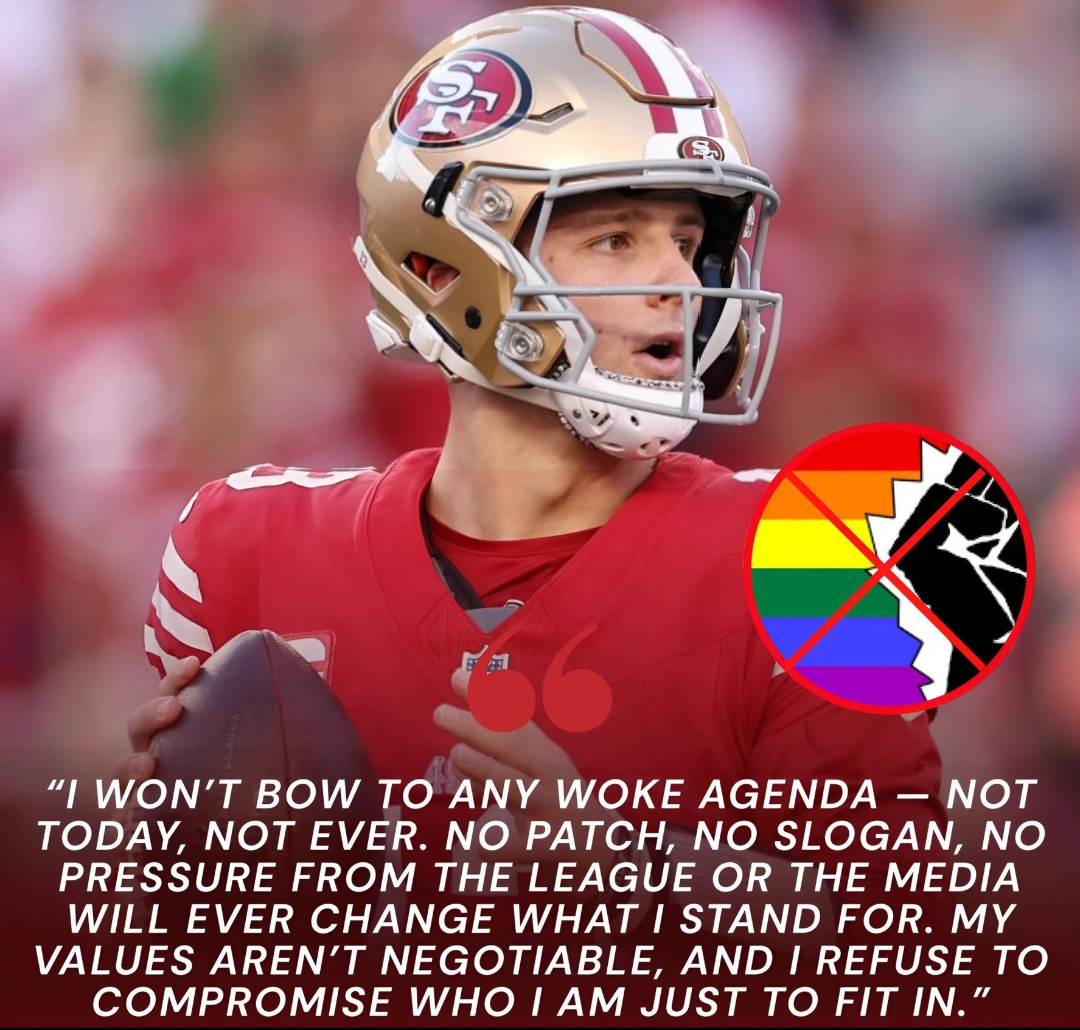San Francisco 49ers quarterback Brock Purdy sent shockwaves through the NFL and beyond when he flat-out refused to wear a rainbow-themed captain’s patch designed to show support for the LGBTQ community. Hours before a highly anticipated prime-time game, Purdy stood at his locker and delivered a blunt statement rejecting what he called the “woke agenda.” His refusal instantly divided fans, teammates, and commentators across the country.

The moment was supposed to be about football—a nationally televised showcase for one of the NFL’s most storied franchises. But Purdy, just 24 years old and already the face of the 49ers, changed the conversation before the first whistle blew. While other players, both teammates and opponents, stitched rainbow patches onto their jerseys as part of a league-wide inclusivity initiative, Purdy firmly declined. Cameras captured him declaring, “I will never wear that patch. I will never endorse a woke agenda.” With arms crossed and voice steady, his words landed like a thunderclap.
Within minutes, clips of his statement spread across social media. The hashtag #Purdy trended on X, Instagram, and TikTok. Supporters praised him as a man of conviction who refused to bow to league or media pressure. Critics, however, accused him of alienating LGBTQ fans and dragging culture wars into a sport meant to unite people across backgrounds.
The backlash hit especially hard in the Bay Area, one of the nation’s most progressive regions. At Levi’s Stadium, some fans arrived waving rainbow flags and holding signs denouncing Purdy, while others held posters supporting his right to stand by his values. Parking lots became battlegrounds of heated debate among 49ers fans in red-and-gold jerseys. For some, Purdy had injected politics into the game. For others, he was courageously standing against what they saw as forced symbolism.
Inside the 49ers locker room, the mood was mixed. Reports suggest that while some teammates quietly supported Purdy’s stance, others were frustrated that the controversy shifted attention away from the team’s preparation. “We worked all week for this game, and now the story is about something else entirely,” one veteran player reportedly said off the record. Still, those who share Purdy’s Christian faith acknowledged that his decision was in line with the values he has openly discussed since entering the league.
The NFL issued a carefully worded statement hours later, reaffirming its commitment to inclusivity and respect without directly naming Purdy. The league’s cautious response raised eyebrows, especially since Purdy is not a fringe player but a rising star who helped lead his team deep into the playoffs last season. Corporate sponsors also chose their words carefully. Nike released a general message in support of diversity but avoided mentioning Purdy directly. Behind the scenes, major retailers reportedly debated whether to feature his jersey in LGBTQ-themed promotions.
For Purdy, the refusal appeared to stem from deeply held personal beliefs rather than a desire to provoke controversy. He has long been vocal about his Christian faith, often speaking about reading scripture daily and prioritizing values over fame. To his supporters, rejecting the patch was simply an extension of that consistency. To critics, it looked like a public rejection of inclusivity, risking harm to marginalized fans who already face discrimination.
The fallout has been immediate. LGBTQ advocacy groups in San Francisco announced plans to protest outside upcoming home games, calling on the 49ers to take a stronger stand than the league’s statement. Some activists even demanded that Purdy be stripped of his captaincy. Meanwhile, conservative commentators praised him as a hero of conscience and suggested he could become a face of resistance to political messaging in sports.
Fans are left torn. Some long-time season ticket holders from LGBTQ households expressed betrayal, saying their support of the team now feels unrecognized. Others defended Purdy, insisting that sports should focus solely on football. The divide highlights the delicate balance modern athletes must navigate between performance on the field and public identity off of it.
What makes this controversy especially significant is Purdy’s role. He is not a backup fighting for a roster spot but the starting quarterback of a team with Super Bowl aspirations. His decision raises broader questions about player autonomy: Should athletes be required to wear symbols of causes they may not personally support? Or should they have the freedom to decline without backlash?
As the season progresses, the long-term consequences remain uncertain. Will Purdy face disciplinary action from the NFL? Will the 49ers’ ownership distance itself, or quietly support his right to free expression? And will the controversy fracture locker room unity at a time when cohesion is crucial for championship hopes?
For now, Purdy seems unfazed. After his statement, he joined pregame warmups with his usual composure, helmet in hand, showing no sign of distraction. When pressed again by reporters, he repeated, “I know where I stand. I’m not here to please everyone.”
The NFL has weathered cultural storms before, from anthem protests to debates over player activism. But this moment stands apart: a young quarterback at the height of his career rejecting a league initiative in blunt terms. Whether Brock Purdy is remembered as a man of principle or as a divisive figure may depend less on touchdowns and victories and more on how fans, teammates, and the culture at large respond to his five simple words: “I will never wear that.”





